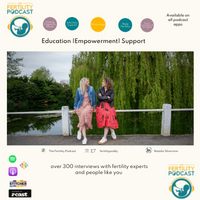What steps to take to make a company fertility- friendly?
We've given you a whoppa of a final episode as we bring this conversation about Fertility Issues at Work to a close... for now.
It's a big topic and we will of course be revisiting it in 2022, watch this space to hear more as we promise you we will be digging deeper and sharing more of your stories as well as championing organisations who are doing this well. First up you'll hear a conversation Natalie had with South Eastern Rail, after seeing its Head of People Kirsten Howes - talk about the Pregnancy Loss Policy the company launched during Baby Loss Awareness week in October 2021.
Inspired by NZ and her own pregnancy loss, Kirsten had wanted to put something into place and when she had been through it and used to speak to people about the reasons they needed time off, she never had anyone come to her. She had no idea how to feel or do when it happened, how much time she should have off, what was normal and on reflection realised what a huge gap there was in the support they provided and how it was spoken about in the workplace.
How was it received?
Kirsten said it was so easy, no residence and it was met with a lot of support from people and 180 people joined their briefing during the launch. The company already have a fertility policy since 2020 created by people who had been through struggles to drive change and they also run working lunches, so people can drop in and join a community that has come together.
How do the conversations happen?
Due to the nature of the work, there have to be 'Safety-critical conversations' as they need to know if people are having treatment as if people are taking medication, they have to know because they get checked. People can’t just drive a train if they aren’t concentrating and could be a safety risk, therefore the channels need to be open for people to talk to their managers.
How to overcome challenges faced by this being a male-dominated industry?
The whole industry is trying to become more diverse and inclusive and it is working on the gender balance, especially with train drivers, and more women are joining, however perception needs to change. WIRE - Women in Rail Empowerment group has list of 6 taboo subjects.
Your experiences:
During this series, we were really interested to hear your experiences in the workplace and we’ve shared many of them. Shona Gilbert got in touch to tell us about her experience in the workplace. She worked in a busy agency at a senior level. After a failed round of IVF she took a break and sometime later, decided to give it another go. Her experience from the first round told her that she needed to prioritise herself and she made the decision to ask her line manager if she could take a sabbatical.
Shona was lucky, her line manager and employers were supportive of her request, however, she acknowledges that this was due to her seniority in the business. She spoke about how her organisation had a fertility policy, but that it was restrictive and more applicable to people in less senior roles than herself who don’t have the privilege of a more flexible role.
This is an interesting workforce disparity that we hadn’t considered before and an interesting topic that needs further investigating….watch this space!
What we've learnt:
Dr. Krystal Wilkinson, Senior Lecturer in HRM, Department of People and Performance talks through the findings from Manchester Metropolitan University and its study ' Complex fertility journeys and Employment' August 2021
Two year study:
We hear about the findings from 80 narrative interviews talking about fertility treatments, tests, miscarriage, involuntary childlessness from men, women and same-sex couples in different workplaces and contracts.
The sample was all at differing stages of the fertility journey and was UK based. We heard about how significant it is that Line managers understand when it comes to a person feeling they can disclose what they are going through, along with the culture of the organisation. People cited their fears around there being a lack of knowledge, invasion of privacy, knowledge of policies and practices - no time, money, organisational culture, whether they are enabled to support.
What is needed?
As we have found with Fertility Matters at Work and our new programme, this research highlights the importance of organisations having access to resources, training, relevant narratives in the workplace which will ideally lead to culture change. Also how important it is to celebrate managers who support people.
We spoke about the Ethnodramas that are being created from the findings and we shared a previous one on The Fertility Podcast which you can listen to here
We spoke about our conversation with Ch4, you can listen here
We also spoke about our conversation with teachers, listen here
We also mentioned the launch of Fertility Matters at Work membership which you can sign up from 4th Jan here
SOCIALS:


